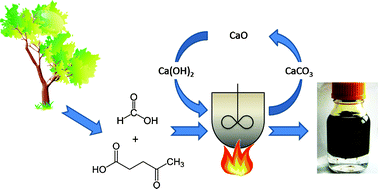US scientists have developed a route to produce liquid hydrocarbon fuels in high yields from cellulosic feedstocks.
Conversion of cellulosic feedstocks into liquid hydrocarbon transportation fuels could have a large impact on supplying our future energy needs. However, at present two barriers hinder it’s commercial implementation; first, the 
In this work, Clayton Wheeler and colleagues from the Bioproducts Research Institute at the University of Maine, USA have used formic acid as a hydrogen source in the thermal deoxygenation of levulinic acid, giving high yields of deoxygenated hydrocarbons. This methods has significant advantages, providing a high-yield, robust, low-pressure, non-catalytic route to hydrocarbon mixtures from biomass, which are similar to petroleum crude oils.
This article is free to access until the 6th January 2012! Click below to find out more…
Liquid hydrocarbon fuels from cellulosic feedstocks viathermal deoxygenation of levulinic acid and formic acid salt mixtures, Paige A. Case, Adriaan R. P. van Heiningen and M. Clayton Wheeler, Green Chem., 2012, DOI: 10.1039/C1GC15914C










